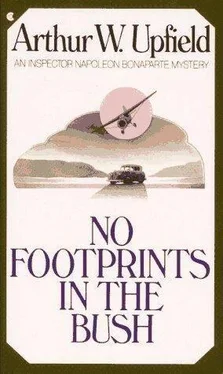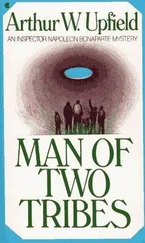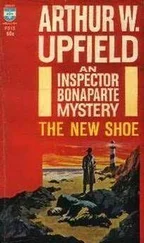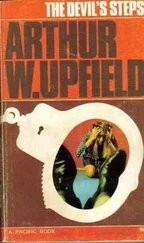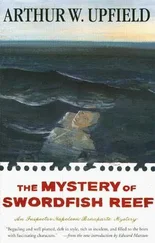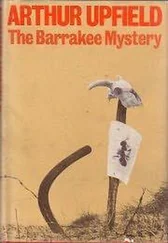Arthur Upfield - No footprints in the bush
Здесь есть возможность читать онлайн «Arthur Upfield - No footprints in the bush» весь текст электронной книги совершенно бесплатно (целиком полную версию без сокращений). В некоторых случаях можно слушать аудио, скачать через торрент в формате fb2 и присутствует краткое содержание. Жанр: Классический детектив, на английском языке. Описание произведения, (предисловие) а так же отзывы посетителей доступны на портале библиотеки ЛибКат.
- Название:No footprints in the bush
- Автор:
- Жанр:
- Год:неизвестен
- ISBN:нет данных
- Рейтинг книги:5 / 5. Голосов: 1
-
Избранное:Добавить в избранное
- Отзывы:
-
Ваша оценка:
- 100
- 1
- 2
- 3
- 4
- 5
No footprints in the bush: краткое содержание, описание и аннотация
Предлагаем к чтению аннотацию, описание, краткое содержание или предисловие (зависит от того, что написал сам автор книги «No footprints in the bush»). Если вы не нашли необходимую информацию о книге — напишите в комментариях, мы постараемся отыскать её.
No footprints in the bush — читать онлайн бесплатно полную книгу (весь текст) целиком
Ниже представлен текст книги, разбитый по страницам. Система сохранения места последней прочитанной страницы, позволяет с удобством читать онлайн бесплатно книгу «No footprints in the bush», без необходимости каждый раз заново искать на чём Вы остановились. Поставьте закладку, и сможете в любой момент перейти на страницу, на которой закончили чтение.
Интервал:
Закладка:
Bony surveyed them above the rim of his glass.
“Your ancestors?” he inquired.
McPherson nodded, saying:
“Everything here was brought from Scotland by my father and mother. That is he above the fireplace. I had it done by a man in Melbourne from one of those old daguerreotype pictures. They were all a tough crowd, theMcPhersons. Just fancy a man, with his wife, coming right out here when the advance of settlement was only just this side of the Diamantina. They brought all their possessions on three bullock wagons. You know anything about furniture?”
“Next to nothing. Jacobean, isn’t it?”
“So they told me. I don’t know anything about furniture, except what I’ve seen in the homesteads on the way to the railway. We still use the iron kettles and pans and things the old people brought with them. Tough. Humph! I often wish I was a quarter as tough. Well, I’ll show you to your room and the bathroom, and leave you, as I’ve work to do before dinner. There’s what we call the library if you’re interested in books.”
The bedroom was in keeping with the hall and the dining-room. Towels lay over a brass handrail. The narrow bed was monastic. There was no floor covering. There was one strikingly discordant note-a gaudy dressing-gown and a pair of blue leather slippers waiting on a chair and the floor. The squatter noticed these articles, and grunted.
“That gown and the slippers were left here by a visitor,” he explained, irritably. “Don’t think I’d select such colours for myself. I’ll leave you. You know where to find things, and the maid will bring tea-if she hasn’t discarded her clothes and gone back to her tribe. And don’t worry about your clothes at dinner. I’ve never dressed for dinner since my mother passed on.”
“I have a reasonably respectable coat in my swag which will conceal my working shirt,” Bony said, adding: “Above table I will appear, well, not naked. I am going to thank you now for the hospitality you have extended to me, and express the wish that I shall have your assistance in my work.”
“I will do what I can.” McPherson was facing the window and Bony observed the smallness of his eyes. “Why did you tell Price just now that Errey had met with an accident?”
“Because the town exchange is not in an official Post Office, and the manner in which poor Errey met his death cannot be made public for the present. I had another reason. I never tolerate interference with an investigation I have begun, and you can imagine the result of the destruction of Errey and his car did it become public. There would be a half-squadron of Air Force machines sent to find that mysterious plane, and then you and I and the blacks would have to go and find the Air Force pilots forced down in that open country.”
“You intend to keep it dark, even from Price?”
“I intend to keep the matter dark from the outside public until I can say: “Sergeant Errey was murdered in such and such a manner and this is the man who killed him and his aboriginal passenger.”
“You first have to arrest the killer.”
Bony’s eyes widened, and the squatter winced as though the light in the blue eyes gazing at him was a weapon. Bony’s voice was metallic when he boasted:
“I shall not fail to bring Errey’s murderer to justice.”
“You will if the Wantella justice reaches him first. The crime was committed on Wantella land, and the Wantella blacks thought highly of Sergeant Errey.”
Left to himself, Bony passed to the window from which a sectional view of the dam wall could be seen. He was not interested in the view, however. His brain demanded opportunity to think, to adjust thought to the unusual. For the first time in his career Bonaparte was thrown off his balance.
He surveyed the incidents of this day, the people he had met. Only the girl appeared normal. Burning Water was slightly abnormal. More so was this Donald McPherson. They would have to be pinned for close examination, like butterflies pinned as to a board and examined through a glass by a naturalist. There would be time later for that-after his body was refreshed.
Turning away from the window, he picked up the dressing-gown. The trace of bewilderment in his eyes gave place to an expression of pleasure, for one carefully restrained inhibition had been admiration for colours in clothes. Ah! Those beautiful ties and socks he had put away in favour of more conservative colours!
The shafts of the setting sun slanting through the open French windows rested on thegown, illuminated its glories. In such a room and in such a house, it was a sheer monstrosity. Its basic colour was a bright yellow and on the base were laid bars of purple and squares of Cambridge blue. What kind of guest had he been who selected such a combination of colours even in a dressing-gown? And the slippers! They were of soft doeskin leather. They had long pointed Eastern toes. Their colour was sky-blue.
Slippers and gown he carried to the bathroom: when he returned he was wearing both and carrying his clothes.
His swag had been placed on a chair, and on a small table were tea and cakes. He now felt refreshed both physically and mentally, and, with a sigh of contentment, he sat in a chair beside the table he placed in front of the long dressing-mirror. And in that mirror, which, too, was slightly out of place, he surveyed himself, admired himself in Joseph’s coat, and ate and drank.
What a gown! What slippers! What a room! What a house! What an investigation awaited him! He could not command his mind whilst encompassed by those alluring colours.
On the floor he unrolled his swag and took from it clean underwear and shaving tools. Again he went to the bathroom, and afterwards dressed, putting on a neat dark-grey serge coat over the clean khaki shirt. Now he felt better, and the clamour in his mind insisted that he hide the dressing-gown beneath the bed pillows and the slippers beneath the bed. He sat down again on the chair to begin the manufacture of a cigarette. Began, for not then did he complete the task. In a flash he was on his hands and knees beside the unrolled swag.
Sergeant Errey’s small attache case he had so carefully rolled in the swag before leaving the camp of the cabbage-trees, had vanished.
The shock succeeded, when past efforts had failed, in restoring his mind to calm normality. He recalled clearly that minute of time in which he had placed the attache case on top of the unrolled blankets and then carefully had rolled and strapped the swag without possibility of case, or any other article, falling from it.
Beyond this fine homestead, beyond the painted Land of Burning Water, lay a shadow as black as night, a shadow in whichflickered the flame of human emotions and passions. Flame in the shadow! It was there, all right. He could feel the heat of the flame in the chill of the shadow.
What had Chief Burning Water said? Why, he had said: “We have seen what we ought not to have seen.” Why did he say that, if he did not know that those Illprinka blacks were present to remove anything not destroyed by the fire: if he did not at least suspect they were acting on the orders of the pilot? That would more than hint he knew, or suspected, a particular man to be the pilot of the aeroplane.
Then McPherson had said just before he had left that very room: “You will (fail) if the Wantella justice reaches him first. The crime was committed on Wantella land, and the Wantella blacks thought highly of Sergeant Errey.” What lay behind that? Was it not the betrayal of knowledge, or suspicion, coinciding with that contained in Chief Burning Water’s statement? If those two men did not know the pilot of the aeroplane, then both of them based on other facts a good guess.
The house and its owner were not normal here on the edge of Central Australia. Chief Burning Water was abnormal, because of his long and close association with theMcPhersons. McPherson was a travesty, a problem. He offered hospitality like a man not wanting to but unable to refuse. There was no warmth in him. Even his temper was not warm. He did not speak with the easy freedom of the bushman, and that seemed to be natural in him and not the evidence of fear. Only the girl was warm and human and open; but even she presented a problem.
Читать дальшеИнтервал:
Закладка:
Похожие книги на «No footprints in the bush»
Представляем Вашему вниманию похожие книги на «No footprints in the bush» списком для выбора. Мы отобрали схожую по названию и смыслу литературу в надежде предоставить читателям больше вариантов отыскать новые, интересные, ещё непрочитанные произведения.
Обсуждение, отзывы о книге «No footprints in the bush» и просто собственные мнения читателей. Оставьте ваши комментарии, напишите, что Вы думаете о произведении, его смысле или главных героях. Укажите что конкретно понравилось, а что нет, и почему Вы так считаете.
